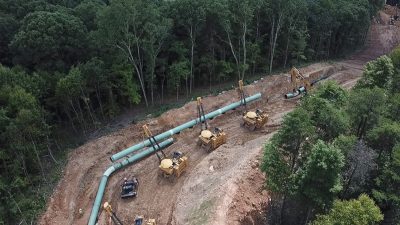Front Porch Blog
By Appalachian Voices staff
UPDATE: On October 22, the Pittsburg District of the Army Corps of Engineers suspended a third water-crossing permit on the project, effectively halting all construction through waters of the entire 303-mile path of the Mountain Valley Pipeline.
Construction of the Mountain Valley Pipeline is now halted at nearly all stream crossings in West Virginia and Virginia, following a court ruling last week. This is in addition to a July court-mandated halt to construction in the Jefferson National Forest.
On Oct. 2, the U.S. Fourth Circuit Court of Appeals vacated a necessary Clean Water Act permit needed for the Mountain Valley Pipeline to be constructed across streams and waterways throughout most of its proposed route in West Virginia.
Then, on Friday, Oct. 5, the Army Corps of Engineers suspended the Mountain Valley Pipeline’s permit for 383 streams crossings and 142 wetland crossings in Virginia. The Roanoke Times reported that a letter to Mountain Valley from William Walker, chief of the regulatory branch of the Corps’ Norfolk division, stated that the permit was pulled to halt construction while they “await clarity on this issue.”
The case centered on Mountain Valley’s inability to comply with a West Virginia condition requiring that stream crossings be completed in 72 hours or less to qualify for the broader, one-size-fits-all Clean Water Act permit, known as Nationwide Permit 12, that the Corps of Engineers used. The record showed Mountain Valley Pipeline would need far longer to build across some of the larger rivers along the route.
“The immediate halt of construction in Virginia and West Virginia is important to the landowners in the pipeline’s path who have carried the burden of experiencing MVP’s faulty construction practices and damages to numerous waterways this year,” Appalachian Voices’ Virginia Field Organizer Lara Mack told The Roanoke Times. “Their suffering is especially egregious due to the utter lack of evidence that more pipeline capacity is even needed in our region.”
The court order is a victory for nonprofit law firm Appalachian Mountain Advocates, which represented Appalachian Voices alongside the Sierra Club, West Virginia Rivers Coalition, Indian Creek Watershed Association and Chesapeake Climate Action Network.
In the wake of the ruling, Appalachian Mountain Advocates expects the Corps may now have to conduct “a significant environmental assessment” to issue an individual Clean Water Act permit for the pipeline instead of the broader permit. The groups are now arguing that the Federal Energy Regulatory Commission (FERC) should issue a stop-work order for the entire pipeline because the certificate that gives Mountain Valley permission to proceed is contingent upon securing all other required federal permits.
“The court’s decision validates what citizens and pipeline opponents have been saying all along — the permitting process for the Mountain Valley Pipeline was fatally flawed, allowing pipeline developers to rush into construction without regard for the devastation to water resources in West Virginia and Virginia,” Appalachian Voices’ Virginia Program Manager Peter Anderson said in a press statement. “We’ve seen this broken approach at every level, starting with FERC’s decision to certify a 300-mile, 42-inch diameter pipeline, despite the lack of evidence that the region even needs any new pipeline capacity.”
According to ProPublica and the Charleston Gazette-Mail, West Virginia regulators are merely rewriting their rules to allow the project to proceed, instead of considering the ramifications of the pipeline. West Virginia’s Department of Environmental Protection recently held a comment period to receive public input on this proposed change. The comment period closed on September 17 and West Virginia residents and our partners expect to see a response from the agency soon. After this process is completed, Mountain Valley would apply for a new permit, expected in early 2019.
While Virginia does not impose the same 72-hour condition on construction, there is a similar case pending at the Fourth Circuit. Petitioners argue that the invalid West Virginia permit renders the Virginia permit invalid as well.
Regulatory and legal actions against the Mountain Valley Pipeline have already taken a toll on the project. On Sept. 24, the private companies behind the pipeline announced the cost of the project had grown to $4.6 billion, a nearly $1 billion increase. And that was before these latest delays, which could have a significant impact on the completion of the pipeline. In the meantime, there is no doubt that these delays are protecting precious water sources for another day. And that counts for a lot.
Two actions you can take to continue the fight to STOP the Mountain Valley Pipeline
- Help monitor and document construction of the Mountain Valley Pipeline! Learn more about the Mountain Valley Watch network led by POWHR Coalition at powhr.org/mvwatch.
- Call Virginia Governor Northam! Tell him about the court decision and that he must do more to protect SWVA communities and our precious water resources! 804-786-2211
PREVIOUS
NEXT
Related News

Leave a comment
Your email address will not be published. Required fields are marked *
5 responses to “Mountain Valley Pipeline ordered to halt construction at stream crossings”
-
A very risky business with pipelines crossing all of the intended waterways so halting the construction was the right thing to do.
-
Please keep making these things known, and keep telling us what steps can we take to support this worthy cause.
-
Thank goodness a glimmer of sanity in the ecocide rush to profit at the expense of our collective future.
-
Gtreat work by Appalachian Mountain Advocates and the five organizations they represented.
-
Leave the pipeline alone. Its a public nessicity as well as employing hinftesds of not thousands of west Virginians as well as virginians


Leave a Comment